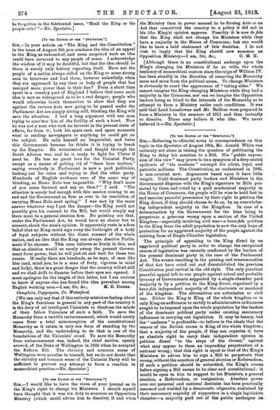[To THE EDITOR 07THS " SPECTATOR."1
Six,—In your article on "The King and the Constitution" in the issue of August 9th you condemn the idea of an appeal to the King as unheard-of, and seem surprised such an idea could have occurred to any people of sense. I acknowledge the wisdom of it may be doubtful, but that the idea should be there is surely only history repeating itself. Have not the people of a nation always called on the King or some strong man to intervene and lead them, however unlawfully, when they are oppressed by any class or body of people that has usurped more power than is their due ? From a short time spent in a country part of England I believe that some such idea is now so widespread as to be a real danger ; people who would otherwise bestir themselves to show that they are against the various Acts now going to be passed under the Parliament Act are simply sitting still, thinking the King will save the situation. I had a long argument with one man trying to conv:nce him of the futility of such a trust. Now be was not a man who took no interest in the present state of affairs, far from it; both his spare cash and spare moments went in reading newspapers or anything he could get on the subject. He calls himself an Imperialist, and hates this Government because be thinks it is trying to break up the Empire. He volunteered and fought through the South African war, and he is ready to fight for Ulster if need be. He has no great love for the Unionist Party, except as a means of getting rid of "these here traitors," saying everybody in Parliament is now a paid politician, looking out for votes and trying to dish the other party. Hundreds of English workmen were of the same way of thinking, so Home Rule was impossible. "Why don't more of you come forward and say so, then ? " I said. "The situation is surely bad enough with this session coming to an end and the Government as firm as ever in its resolution of carrying Home Rule next spring." I was met by the same answer whatever way I put the danger—the King could not possibly give his consent to the Bill, but would simply say there must be a general election first. No pointing out that, under the Parliament Act, he would have no choice but to consent, shook the man's opinion. It apparently rests in a firm belief that no King could sign away the birthright of a body of loyal subjects without the direct consent of the whole nation, and an idea that the King can always dissolve Parlia- ment if he chooses. This man believes so firmly in this, and that an election would so surely sweep the present Govern- ment from power, that he will just sit and wait for these two events. If really there are hundreds, as he says, of men like him (and, mind you, he is a man of forty, vigorous in mind and body), there is a great danger that the country will sit still and we shall drift to disaster before their eyes are opened. I must apologize for the length of this letter, but I am curious to know if anyone else has found this idea prevalent among
[We can only say that if this entirely mistaken feeling about the King's functions is general in any part of the country it is the duty of all intelligent Unionists to disabuse the minds of their fellow Unionists of such a faith. To save the Monarchy from a terrible embarrassment, which would surely ensue from a total misconception of the constitutional Monarchy as it exists, is only one form of standing by the Monarchy, and the undertaking to do that is one of the foundations of the Unionists' creed. To save the Monarchy from embarrassment was, indeed, the chief motive, openly avowed, of the Duke of Wellington in 1832 when he accepted the Reform Bill. The chivalry and common sense of Wellington were peculiar to himself, but we do not doubt that the chivalry and common sense of the Unionist Party will be sufficient to prevent any attempt to force a reaction in monarchical practice.—ED. Spectator.]






































 Previous page
Previous page